Entrepreneurship and Small Business Management Report - UK Context
VerifiedAdded on 2020/11/12
|15
|4698
|320
Report
AI Summary
This report delves into the realm of entrepreneurship and small business management, providing a comprehensive analysis of various venture types, including micro, small, medium, scalable, large, and social enterprises. It examines the similarities and differences between these ventures, highlighting their roles in economic growth and development, particularly within the UK context. The report presents relevant data and statistics to illustrate the impact of small businesses on the UK economy, including job creation, contribution to GDP, and poverty reduction. Furthermore, it explores the characteristics, traits, and skills that distinguish successful entrepreneurs from business managers, analyzing how entrepreneurial personalities reflect their motivations and mindsets. The report also investigates how background and experience can either foster or hinder entrepreneurship, providing practical examples to support its findings. The report is structured into four tasks. Task 1 analyses types of entrepreneurial ventures. Task 2 focuses on the impact of small businesses on the UK economy. Task 3 explores entrepreneurial characteristics. Task 4 analyzes how background can affect entrepreneurship. The report concludes with a summary of the key findings and implications for the field of entrepreneurship.

Entrepreneurship and
Small Business
Management
Small Business
Management
Paraphrase This Document
Need a fresh take? Get an instant paraphrase of this document with our AI Paraphraser
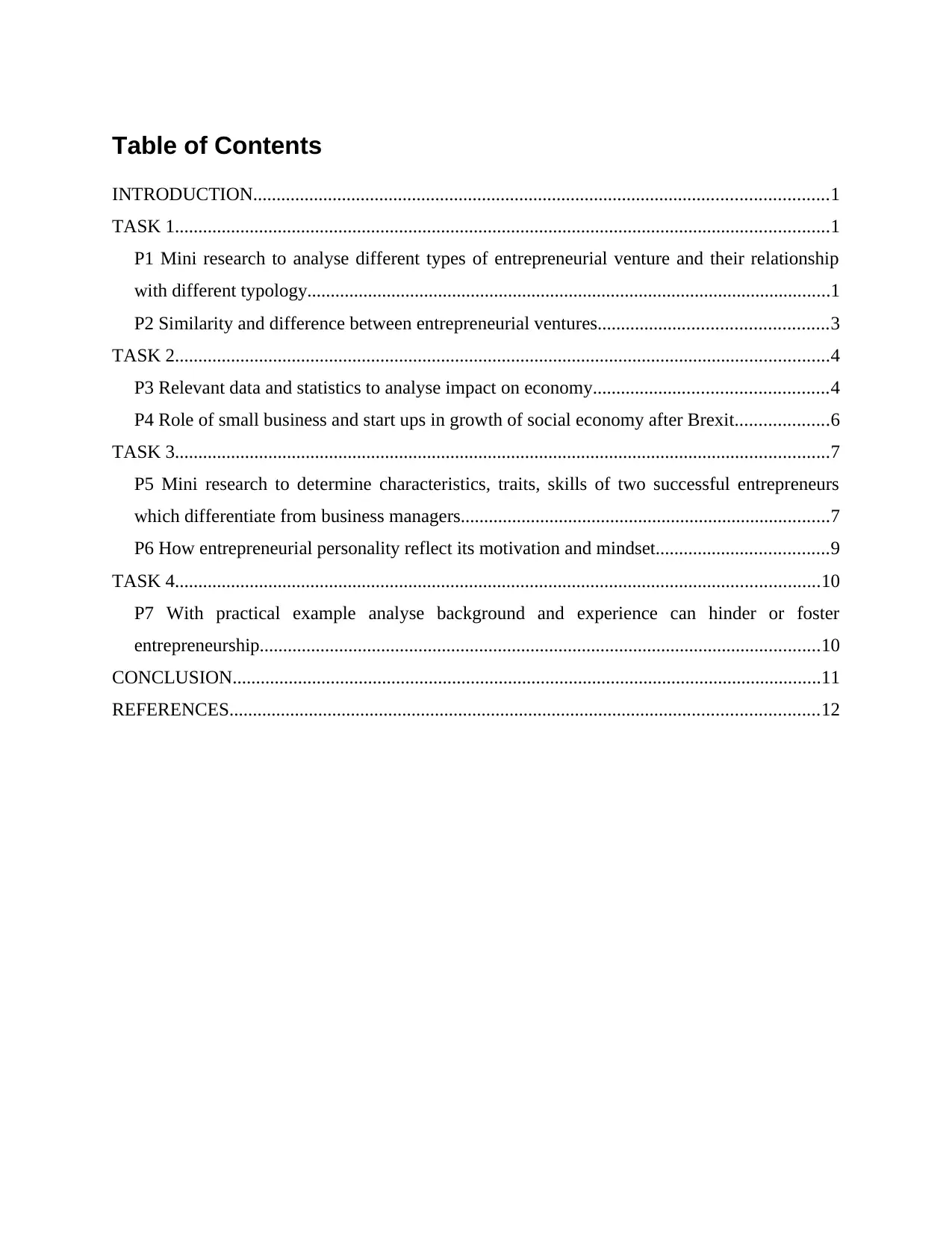
Table of Contents
INTRODUCTION...........................................................................................................................1
TASK 1............................................................................................................................................1
P1 Mini research to analyse different types of entrepreneurial venture and their relationship
with different typology................................................................................................................1
P2 Similarity and difference between entrepreneurial ventures.................................................3
TASK 2............................................................................................................................................4
P3 Relevant data and statistics to analyse impact on economy..................................................4
P4 Role of small business and start ups in growth of social economy after Brexit....................6
TASK 3............................................................................................................................................7
P5 Mini research to determine characteristics, traits, skills of two successful entrepreneurs
which differentiate from business managers...............................................................................7
P6 How entrepreneurial personality reflect its motivation and mindset.....................................9
TASK 4..........................................................................................................................................10
P7 With practical example analyse background and experience can hinder or foster
entrepreneurship........................................................................................................................10
CONCLUSION..............................................................................................................................11
REFERENCES..............................................................................................................................12
INTRODUCTION...........................................................................................................................1
TASK 1............................................................................................................................................1
P1 Mini research to analyse different types of entrepreneurial venture and their relationship
with different typology................................................................................................................1
P2 Similarity and difference between entrepreneurial ventures.................................................3
TASK 2............................................................................................................................................4
P3 Relevant data and statistics to analyse impact on economy..................................................4
P4 Role of small business and start ups in growth of social economy after Brexit....................6
TASK 3............................................................................................................................................7
P5 Mini research to determine characteristics, traits, skills of two successful entrepreneurs
which differentiate from business managers...............................................................................7
P6 How entrepreneurial personality reflect its motivation and mindset.....................................9
TASK 4..........................................................................................................................................10
P7 With practical example analyse background and experience can hinder or foster
entrepreneurship........................................................................................................................10
CONCLUSION..............................................................................................................................11
REFERENCES..............................................................................................................................12
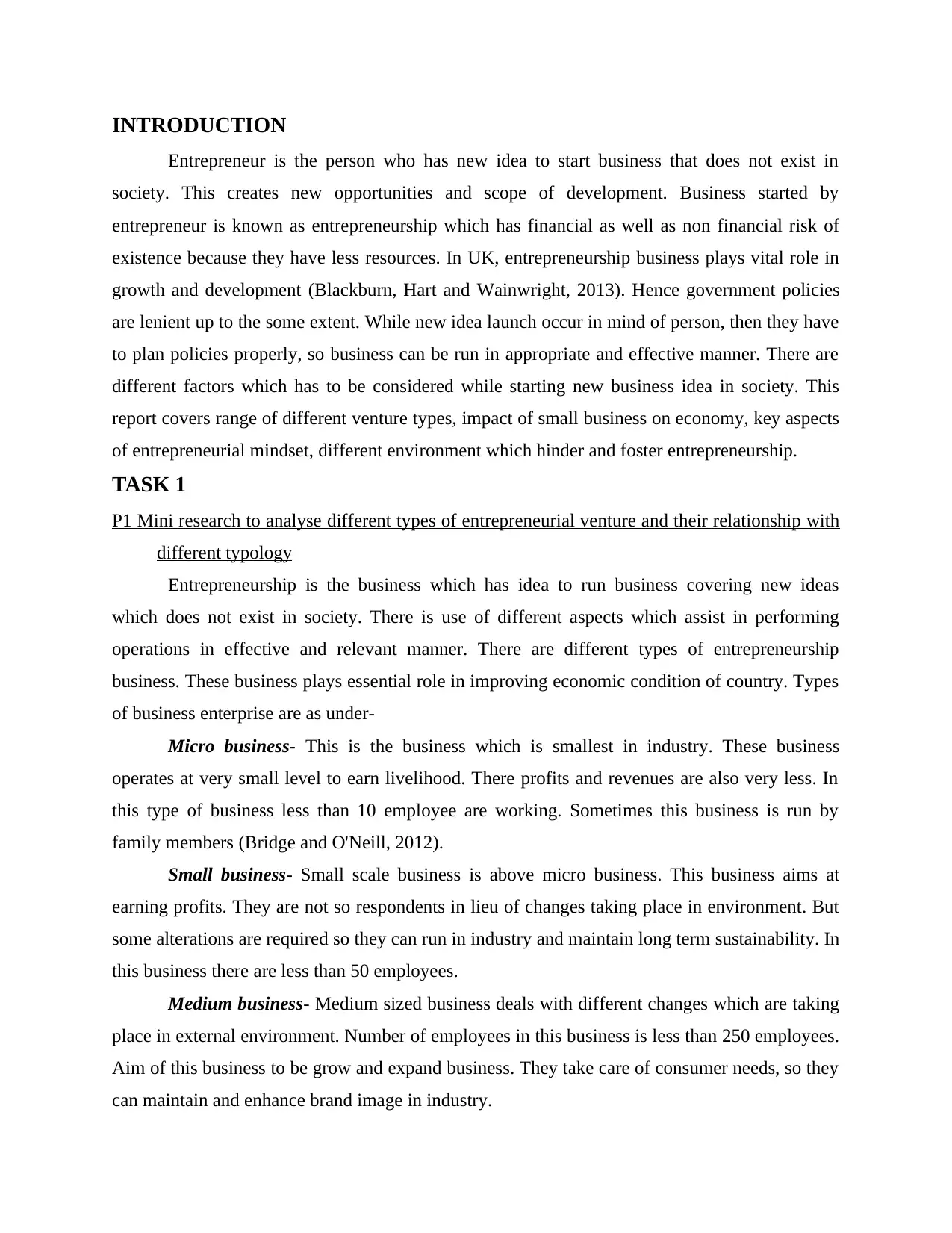
INTRODUCTION
Entrepreneur is the person who has new idea to start business that does not exist in
society. This creates new opportunities and scope of development. Business started by
entrepreneur is known as entrepreneurship which has financial as well as non financial risk of
existence because they have less resources. In UK, entrepreneurship business plays vital role in
growth and development (Blackburn, Hart and Wainwright, 2013). Hence government policies
are lenient up to the some extent. While new idea launch occur in mind of person, then they have
to plan policies properly, so business can be run in appropriate and effective manner. There are
different factors which has to be considered while starting new business idea in society. This
report covers range of different venture types, impact of small business on economy, key aspects
of entrepreneurial mindset, different environment which hinder and foster entrepreneurship.
TASK 1
P1 Mini research to analyse different types of entrepreneurial venture and their relationship with
different typology
Entrepreneurship is the business which has idea to run business covering new ideas
which does not exist in society. There is use of different aspects which assist in performing
operations in effective and relevant manner. There are different types of entrepreneurship
business. These business plays essential role in improving economic condition of country. Types
of business enterprise are as under-
Micro business- This is the business which is smallest in industry. These business
operates at very small level to earn livelihood. There profits and revenues are also very less. In
this type of business less than 10 employee are working. Sometimes this business is run by
family members (Bridge and O'Neill, 2012).
Small business- Small scale business is above micro business. This business aims at
earning profits. They are not so respondents in lieu of changes taking place in environment. But
some alterations are required so they can run in industry and maintain long term sustainability. In
this business there are less than 50 employees.
Medium business- Medium sized business deals with different changes which are taking
place in external environment. Number of employees in this business is less than 250 employees.
Aim of this business to be grow and expand business. They take care of consumer needs, so they
can maintain and enhance brand image in industry.
Entrepreneur is the person who has new idea to start business that does not exist in
society. This creates new opportunities and scope of development. Business started by
entrepreneur is known as entrepreneurship which has financial as well as non financial risk of
existence because they have less resources. In UK, entrepreneurship business plays vital role in
growth and development (Blackburn, Hart and Wainwright, 2013). Hence government policies
are lenient up to the some extent. While new idea launch occur in mind of person, then they have
to plan policies properly, so business can be run in appropriate and effective manner. There are
different factors which has to be considered while starting new business idea in society. This
report covers range of different venture types, impact of small business on economy, key aspects
of entrepreneurial mindset, different environment which hinder and foster entrepreneurship.
TASK 1
P1 Mini research to analyse different types of entrepreneurial venture and their relationship with
different typology
Entrepreneurship is the business which has idea to run business covering new ideas
which does not exist in society. There is use of different aspects which assist in performing
operations in effective and relevant manner. There are different types of entrepreneurship
business. These business plays essential role in improving economic condition of country. Types
of business enterprise are as under-
Micro business- This is the business which is smallest in industry. These business
operates at very small level to earn livelihood. There profits and revenues are also very less. In
this type of business less than 10 employee are working. Sometimes this business is run by
family members (Bridge and O'Neill, 2012).
Small business- Small scale business is above micro business. This business aims at
earning profits. They are not so respondents in lieu of changes taking place in environment. But
some alterations are required so they can run in industry and maintain long term sustainability. In
this business there are less than 50 employees.
Medium business- Medium sized business deals with different changes which are taking
place in external environment. Number of employees in this business is less than 250 employees.
Aim of this business to be grow and expand business. They take care of consumer needs, so they
can maintain and enhance brand image in industry.
⊘ This is a preview!⊘
Do you want full access?
Subscribe today to unlock all pages.

Trusted by 1+ million students worldwide
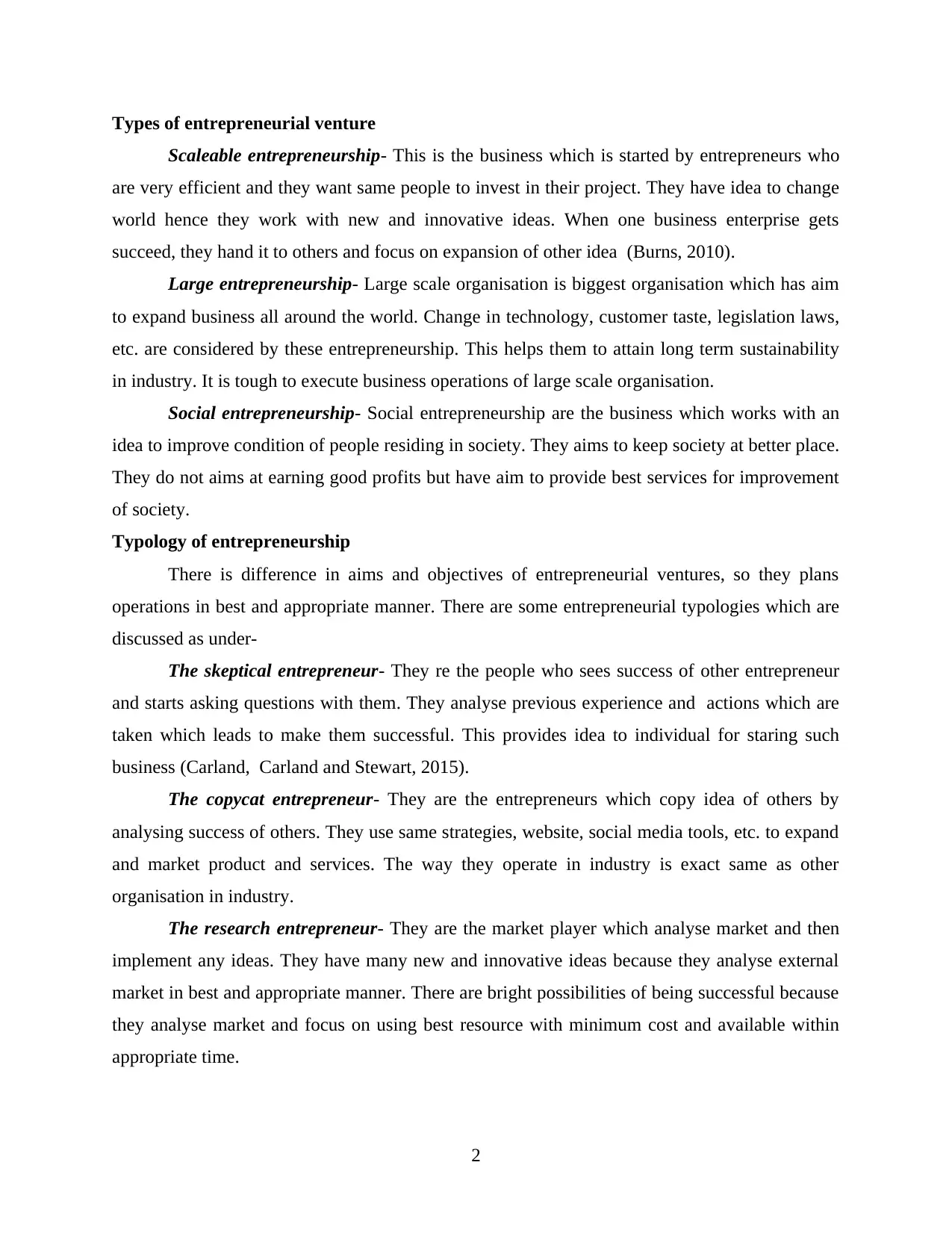
Types of entrepreneurial venture
Scaleable entrepreneurship- This is the business which is started by entrepreneurs who
are very efficient and they want same people to invest in their project. They have idea to change
world hence they work with new and innovative ideas. When one business enterprise gets
succeed, they hand it to others and focus on expansion of other idea (Burns, 2010).
Large entrepreneurship- Large scale organisation is biggest organisation which has aim
to expand business all around the world. Change in technology, customer taste, legislation laws,
etc. are considered by these entrepreneurship. This helps them to attain long term sustainability
in industry. It is tough to execute business operations of large scale organisation.
Social entrepreneurship- Social entrepreneurship are the business which works with an
idea to improve condition of people residing in society. They aims to keep society at better place.
They do not aims at earning good profits but have aim to provide best services for improvement
of society.
Typology of entrepreneurship
There is difference in aims and objectives of entrepreneurial ventures, so they plans
operations in best and appropriate manner. There are some entrepreneurial typologies which are
discussed as under-
The skeptical entrepreneur- They re the people who sees success of other entrepreneur
and starts asking questions with them. They analyse previous experience and actions which are
taken which leads to make them successful. This provides idea to individual for staring such
business (Carland, Carland and Stewart, 2015).
The copycat entrepreneur- They are the entrepreneurs which copy idea of others by
analysing success of others. They use same strategies, website, social media tools, etc. to expand
and market product and services. The way they operate in industry is exact same as other
organisation in industry.
The research entrepreneur- They are the market player which analyse market and then
implement any ideas. They have many new and innovative ideas because they analyse external
market in best and appropriate manner. There are bright possibilities of being successful because
they analyse market and focus on using best resource with minimum cost and available within
appropriate time.
2
Scaleable entrepreneurship- This is the business which is started by entrepreneurs who
are very efficient and they want same people to invest in their project. They have idea to change
world hence they work with new and innovative ideas. When one business enterprise gets
succeed, they hand it to others and focus on expansion of other idea (Burns, 2010).
Large entrepreneurship- Large scale organisation is biggest organisation which has aim
to expand business all around the world. Change in technology, customer taste, legislation laws,
etc. are considered by these entrepreneurship. This helps them to attain long term sustainability
in industry. It is tough to execute business operations of large scale organisation.
Social entrepreneurship- Social entrepreneurship are the business which works with an
idea to improve condition of people residing in society. They aims to keep society at better place.
They do not aims at earning good profits but have aim to provide best services for improvement
of society.
Typology of entrepreneurship
There is difference in aims and objectives of entrepreneurial ventures, so they plans
operations in best and appropriate manner. There are some entrepreneurial typologies which are
discussed as under-
The skeptical entrepreneur- They re the people who sees success of other entrepreneur
and starts asking questions with them. They analyse previous experience and actions which are
taken which leads to make them successful. This provides idea to individual for staring such
business (Carland, Carland and Stewart, 2015).
The copycat entrepreneur- They are the entrepreneurs which copy idea of others by
analysing success of others. They use same strategies, website, social media tools, etc. to expand
and market product and services. The way they operate in industry is exact same as other
organisation in industry.
The research entrepreneur- They are the market player which analyse market and then
implement any ideas. They have many new and innovative ideas because they analyse external
market in best and appropriate manner. There are bright possibilities of being successful because
they analyse market and focus on using best resource with minimum cost and available within
appropriate time.
2
Paraphrase This Document
Need a fresh take? Get an instant paraphrase of this document with our AI Paraphraser
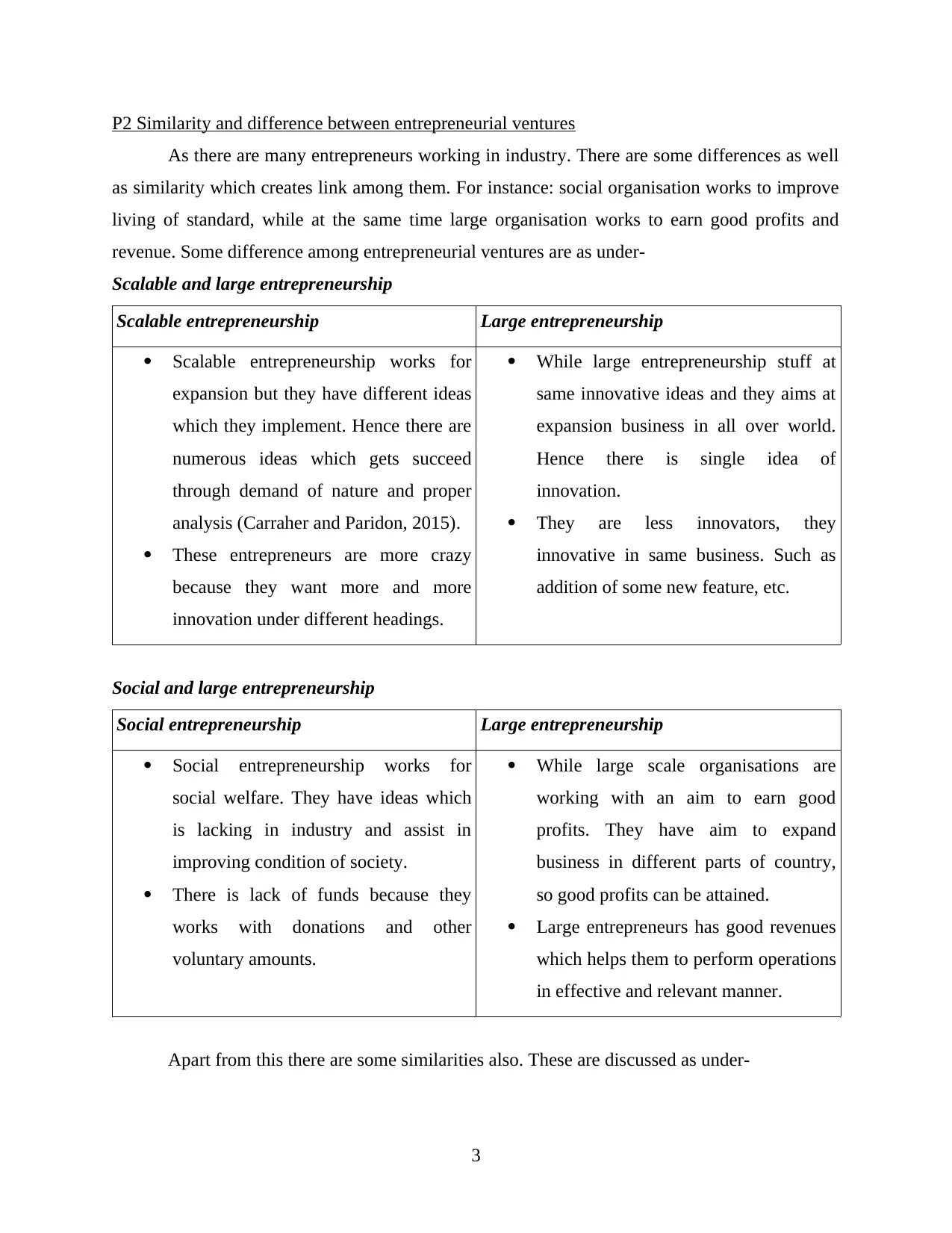
P2 Similarity and difference between entrepreneurial ventures
As there are many entrepreneurs working in industry. There are some differences as well
as similarity which creates link among them. For instance: social organisation works to improve
living of standard, while at the same time large organisation works to earn good profits and
revenue. Some difference among entrepreneurial ventures are as under-
Scalable and large entrepreneurship
Scalable entrepreneurship Large entrepreneurship
Scalable entrepreneurship works for
expansion but they have different ideas
which they implement. Hence there are
numerous ideas which gets succeed
through demand of nature and proper
analysis (Carraher and Paridon, 2015).
These entrepreneurs are more crazy
because they want more and more
innovation under different headings.
While large entrepreneurship stuff at
same innovative ideas and they aims at
expansion business in all over world.
Hence there is single idea of
innovation.
They are less innovators, they
innovative in same business. Such as
addition of some new feature, etc.
Social and large entrepreneurship
Social entrepreneurship Large entrepreneurship
Social entrepreneurship works for
social welfare. They have ideas which
is lacking in industry and assist in
improving condition of society.
There is lack of funds because they
works with donations and other
voluntary amounts.
While large scale organisations are
working with an aim to earn good
profits. They have aim to expand
business in different parts of country,
so good profits can be attained.
Large entrepreneurs has good revenues
which helps them to perform operations
in effective and relevant manner.
Apart from this there are some similarities also. These are discussed as under-
3
As there are many entrepreneurs working in industry. There are some differences as well
as similarity which creates link among them. For instance: social organisation works to improve
living of standard, while at the same time large organisation works to earn good profits and
revenue. Some difference among entrepreneurial ventures are as under-
Scalable and large entrepreneurship
Scalable entrepreneurship Large entrepreneurship
Scalable entrepreneurship works for
expansion but they have different ideas
which they implement. Hence there are
numerous ideas which gets succeed
through demand of nature and proper
analysis (Carraher and Paridon, 2015).
These entrepreneurs are more crazy
because they want more and more
innovation under different headings.
While large entrepreneurship stuff at
same innovative ideas and they aims at
expansion business in all over world.
Hence there is single idea of
innovation.
They are less innovators, they
innovative in same business. Such as
addition of some new feature, etc.
Social and large entrepreneurship
Social entrepreneurship Large entrepreneurship
Social entrepreneurship works for
social welfare. They have ideas which
is lacking in industry and assist in
improving condition of society.
There is lack of funds because they
works with donations and other
voluntary amounts.
While large scale organisations are
working with an aim to earn good
profits. They have aim to expand
business in different parts of country,
so good profits can be attained.
Large entrepreneurs has good revenues
which helps them to perform operations
in effective and relevant manner.
Apart from this there are some similarities also. These are discussed as under-
3
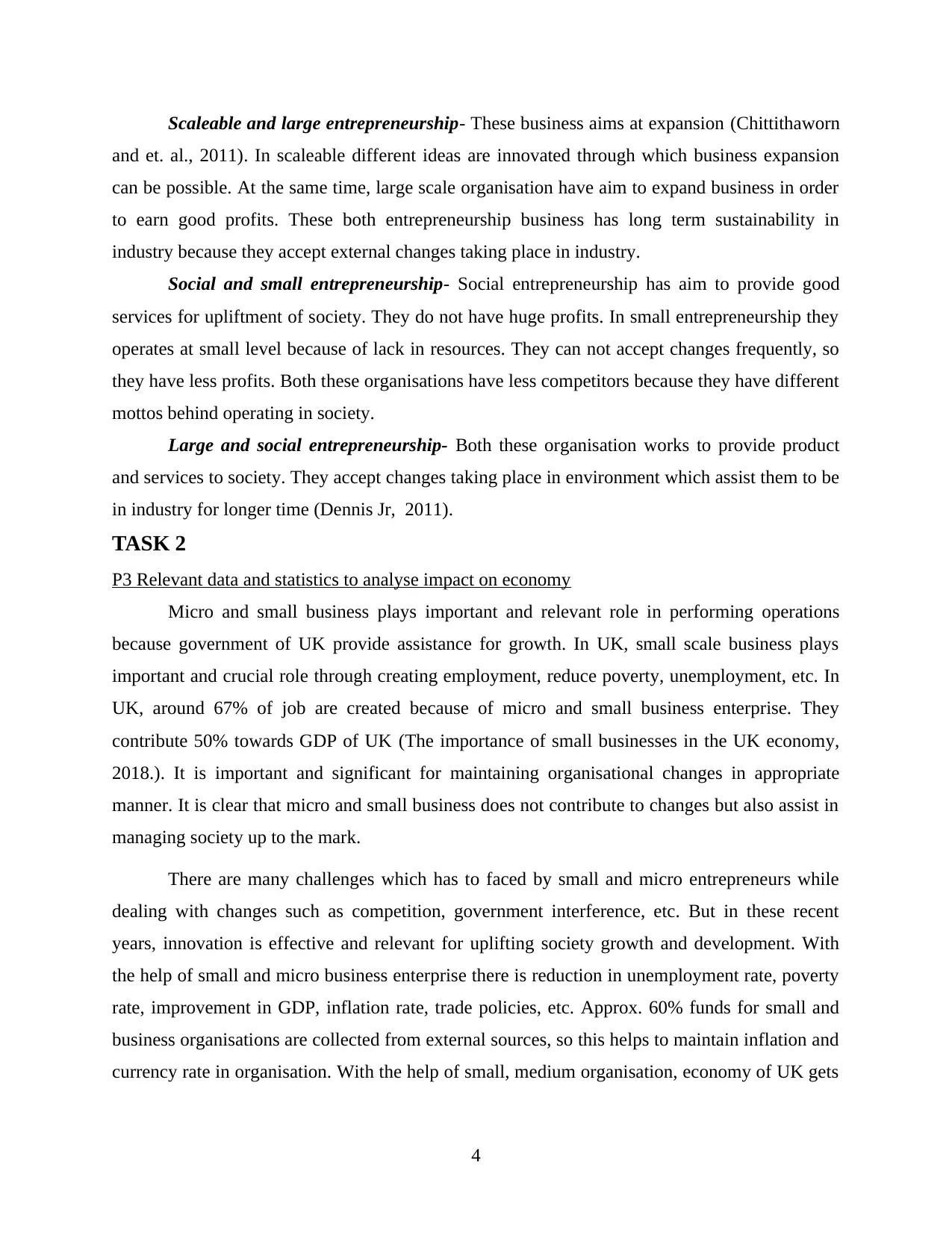
Scaleable and large entrepreneurship- These business aims at expansion (Chittithaworn
and et. al., 2011). In scaleable different ideas are innovated through which business expansion
can be possible. At the same time, large scale organisation have aim to expand business in order
to earn good profits. These both entrepreneurship business has long term sustainability in
industry because they accept external changes taking place in industry.
Social and small entrepreneurship- Social entrepreneurship has aim to provide good
services for upliftment of society. They do not have huge profits. In small entrepreneurship they
operates at small level because of lack in resources. They can not accept changes frequently, so
they have less profits. Both these organisations have less competitors because they have different
mottos behind operating in society.
Large and social entrepreneurship- Both these organisation works to provide product
and services to society. They accept changes taking place in environment which assist them to be
in industry for longer time (Dennis Jr, 2011).
TASK 2
P3 Relevant data and statistics to analyse impact on economy
Micro and small business plays important and relevant role in performing operations
because government of UK provide assistance for growth. In UK, small scale business plays
important and crucial role through creating employment, reduce poverty, unemployment, etc. In
UK, around 67% of job are created because of micro and small business enterprise. They
contribute 50% towards GDP of UK (The importance of small businesses in the UK economy,
2018.). It is important and significant for maintaining organisational changes in appropriate
manner. It is clear that micro and small business does not contribute to changes but also assist in
managing society up to the mark.
There are many challenges which has to faced by small and micro entrepreneurs while
dealing with changes such as competition, government interference, etc. But in these recent
years, innovation is effective and relevant for uplifting society growth and development. With
the help of small and micro business enterprise there is reduction in unemployment rate, poverty
rate, improvement in GDP, inflation rate, trade policies, etc. Approx. 60% funds for small and
business organisations are collected from external sources, so this helps to maintain inflation and
currency rate in organisation. With the help of small, medium organisation, economy of UK gets
4
and et. al., 2011). In scaleable different ideas are innovated through which business expansion
can be possible. At the same time, large scale organisation have aim to expand business in order
to earn good profits. These both entrepreneurship business has long term sustainability in
industry because they accept external changes taking place in industry.
Social and small entrepreneurship- Social entrepreneurship has aim to provide good
services for upliftment of society. They do not have huge profits. In small entrepreneurship they
operates at small level because of lack in resources. They can not accept changes frequently, so
they have less profits. Both these organisations have less competitors because they have different
mottos behind operating in society.
Large and social entrepreneurship- Both these organisation works to provide product
and services to society. They accept changes taking place in environment which assist them to be
in industry for longer time (Dennis Jr, 2011).
TASK 2
P3 Relevant data and statistics to analyse impact on economy
Micro and small business plays important and relevant role in performing operations
because government of UK provide assistance for growth. In UK, small scale business plays
important and crucial role through creating employment, reduce poverty, unemployment, etc. In
UK, around 67% of job are created because of micro and small business enterprise. They
contribute 50% towards GDP of UK (The importance of small businesses in the UK economy,
2018.). It is important and significant for maintaining organisational changes in appropriate
manner. It is clear that micro and small business does not contribute to changes but also assist in
managing society up to the mark.
There are many challenges which has to faced by small and micro entrepreneurs while
dealing with changes such as competition, government interference, etc. But in these recent
years, innovation is effective and relevant for uplifting society growth and development. With
the help of small and micro business enterprise there is reduction in unemployment rate, poverty
rate, improvement in GDP, inflation rate, trade policies, etc. Approx. 60% funds for small and
business organisations are collected from external sources, so this helps to maintain inflation and
currency rate in organisation. With the help of small, medium organisation, economy of UK gets
4
⊘ This is a preview!⊘
Do you want full access?
Subscribe today to unlock all pages.

Trusted by 1+ million students worldwide

boosted and enhance performance of overall country. Approx. 47% of revenue of UK is due to
small ans medium sized organisation.
5
small ans medium sized organisation.
5
Paraphrase This Document
Need a fresh take? Get an instant paraphrase of this document with our AI Paraphraser
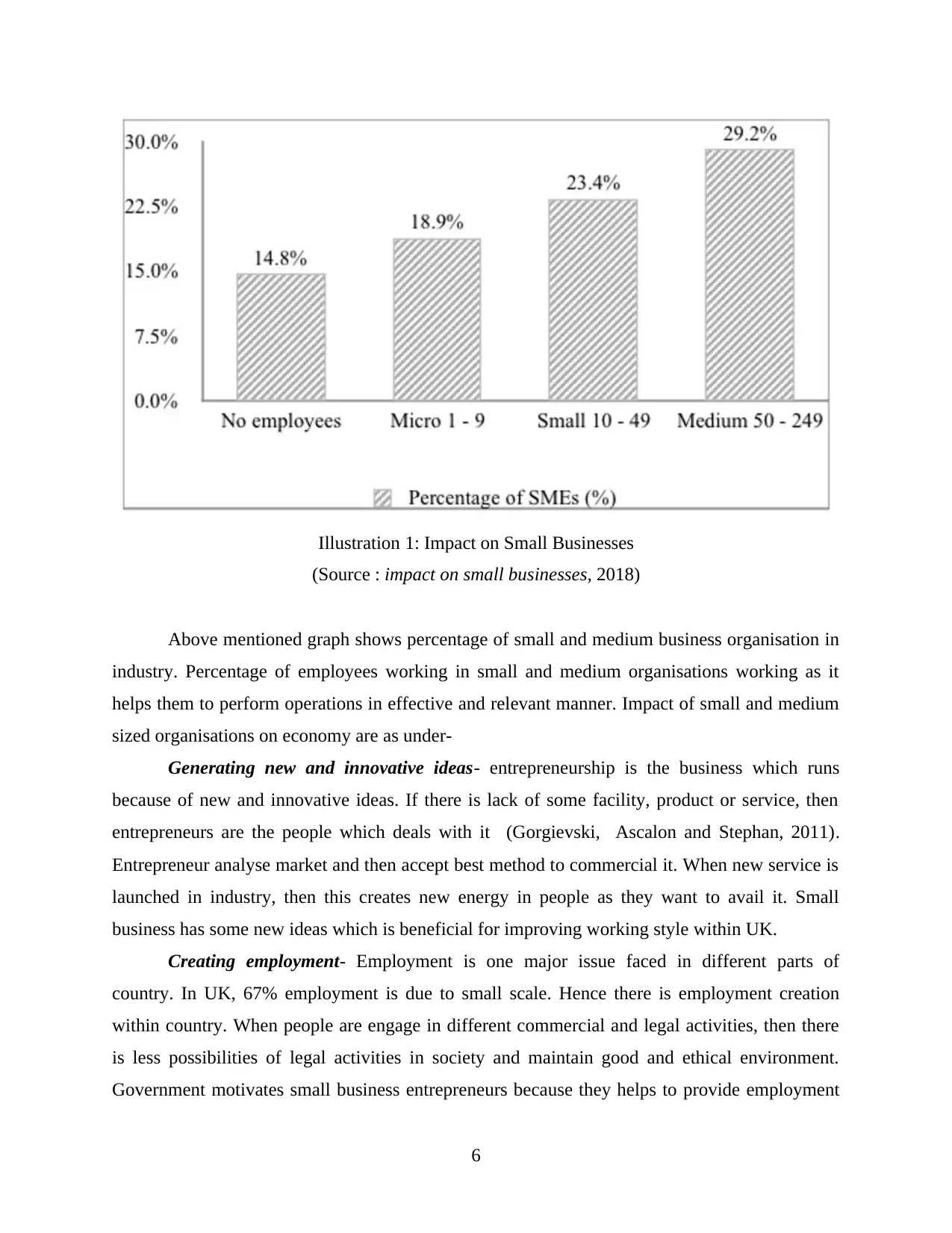
Illustration 1: Impact on Small Businesses
(Source : impact on small businesses, 2018)
Above mentioned graph shows percentage of small and medium business organisation in
industry. Percentage of employees working in small and medium organisations working as it
helps them to perform operations in effective and relevant manner. Impact of small and medium
sized organisations on economy are as under-
Generating new and innovative ideas- entrepreneurship is the business which runs
because of new and innovative ideas. If there is lack of some facility, product or service, then
entrepreneurs are the people which deals with it (Gorgievski, Ascalon and Stephan, 2011).
Entrepreneur analyse market and then accept best method to commercial it. When new service is
launched in industry, then this creates new energy in people as they want to avail it. Small
business has some new ideas which is beneficial for improving working style within UK.
Creating employment- Employment is one major issue faced in different parts of
country. In UK, 67% employment is due to small scale. Hence there is employment creation
within country. When people are engage in different commercial and legal activities, then there
is less possibilities of legal activities in society and maintain good and ethical environment.
Government motivates small business entrepreneurs because they helps to provide employment
6
(Source : impact on small businesses, 2018)
Above mentioned graph shows percentage of small and medium business organisation in
industry. Percentage of employees working in small and medium organisations working as it
helps them to perform operations in effective and relevant manner. Impact of small and medium
sized organisations on economy are as under-
Generating new and innovative ideas- entrepreneurship is the business which runs
because of new and innovative ideas. If there is lack of some facility, product or service, then
entrepreneurs are the people which deals with it (Gorgievski, Ascalon and Stephan, 2011).
Entrepreneur analyse market and then accept best method to commercial it. When new service is
launched in industry, then this creates new energy in people as they want to avail it. Small
business has some new ideas which is beneficial for improving working style within UK.
Creating employment- Employment is one major issue faced in different parts of
country. In UK, 67% employment is due to small scale. Hence there is employment creation
within country. When people are engage in different commercial and legal activities, then there
is less possibilities of legal activities in society and maintain good and ethical environment.
Government motivates small business entrepreneurs because they helps to provide employment
6
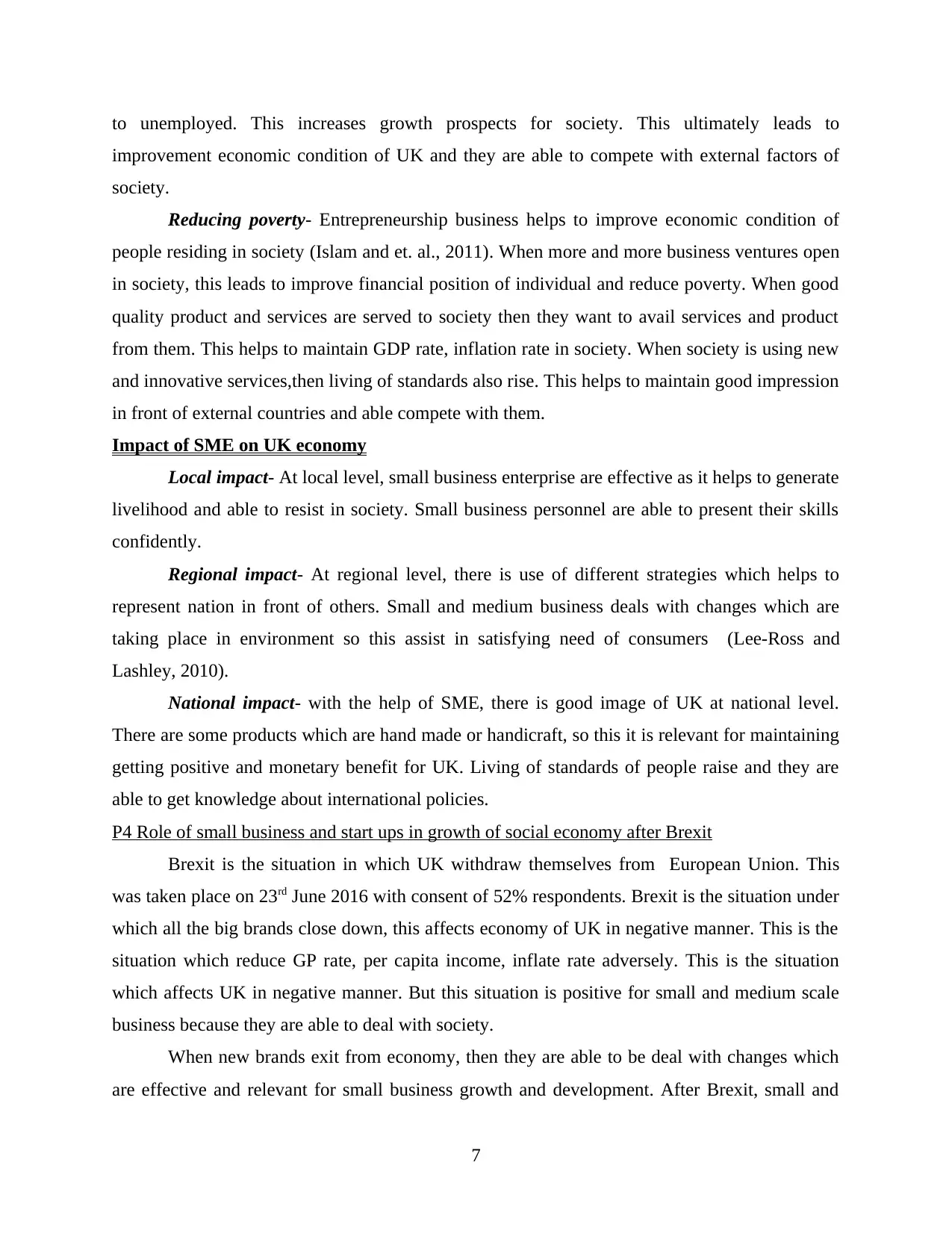
to unemployed. This increases growth prospects for society. This ultimately leads to
improvement economic condition of UK and they are able to compete with external factors of
society.
Reducing poverty- Entrepreneurship business helps to improve economic condition of
people residing in society (Islam and et. al., 2011). When more and more business ventures open
in society, this leads to improve financial position of individual and reduce poverty. When good
quality product and services are served to society then they want to avail services and product
from them. This helps to maintain GDP rate, inflation rate in society. When society is using new
and innovative services,then living of standards also rise. This helps to maintain good impression
in front of external countries and able compete with them.
Impact of SME on UK economy
Local impact- At local level, small business enterprise are effective as it helps to generate
livelihood and able to resist in society. Small business personnel are able to present their skills
confidently.
Regional impact- At regional level, there is use of different strategies which helps to
represent nation in front of others. Small and medium business deals with changes which are
taking place in environment so this assist in satisfying need of consumers (Lee-Ross and
Lashley, 2010).
National impact- with the help of SME, there is good image of UK at national level.
There are some products which are hand made or handicraft, so this it is relevant for maintaining
getting positive and monetary benefit for UK. Living of standards of people raise and they are
able to get knowledge about international policies.
P4 Role of small business and start ups in growth of social economy after Brexit
Brexit is the situation in which UK withdraw themselves from European Union. This
was taken place on 23rd June 2016 with consent of 52% respondents. Brexit is the situation under
which all the big brands close down, this affects economy of UK in negative manner. This is the
situation which reduce GP rate, per capita income, inflate rate adversely. This is the situation
which affects UK in negative manner. But this situation is positive for small and medium scale
business because they are able to deal with society.
When new brands exit from economy, then they are able to be deal with changes which
are effective and relevant for small business growth and development. After Brexit, small and
7
improvement economic condition of UK and they are able to compete with external factors of
society.
Reducing poverty- Entrepreneurship business helps to improve economic condition of
people residing in society (Islam and et. al., 2011). When more and more business ventures open
in society, this leads to improve financial position of individual and reduce poverty. When good
quality product and services are served to society then they want to avail services and product
from them. This helps to maintain GDP rate, inflation rate in society. When society is using new
and innovative services,then living of standards also rise. This helps to maintain good impression
in front of external countries and able compete with them.
Impact of SME on UK economy
Local impact- At local level, small business enterprise are effective as it helps to generate
livelihood and able to resist in society. Small business personnel are able to present their skills
confidently.
Regional impact- At regional level, there is use of different strategies which helps to
represent nation in front of others. Small and medium business deals with changes which are
taking place in environment so this assist in satisfying need of consumers (Lee-Ross and
Lashley, 2010).
National impact- with the help of SME, there is good image of UK at national level.
There are some products which are hand made or handicraft, so this it is relevant for maintaining
getting positive and monetary benefit for UK. Living of standards of people raise and they are
able to get knowledge about international policies.
P4 Role of small business and start ups in growth of social economy after Brexit
Brexit is the situation in which UK withdraw themselves from European Union. This
was taken place on 23rd June 2016 with consent of 52% respondents. Brexit is the situation under
which all the big brands close down, this affects economy of UK in negative manner. This is the
situation which reduce GP rate, per capita income, inflate rate adversely. This is the situation
which affects UK in negative manner. But this situation is positive for small and medium scale
business because they are able to deal with society.
When new brands exit from economy, then they are able to be deal with changes which
are effective and relevant for small business growth and development. After Brexit, small and
7
⊘ This is a preview!⊘
Do you want full access?
Subscribe today to unlock all pages.

Trusted by 1+ million students worldwide
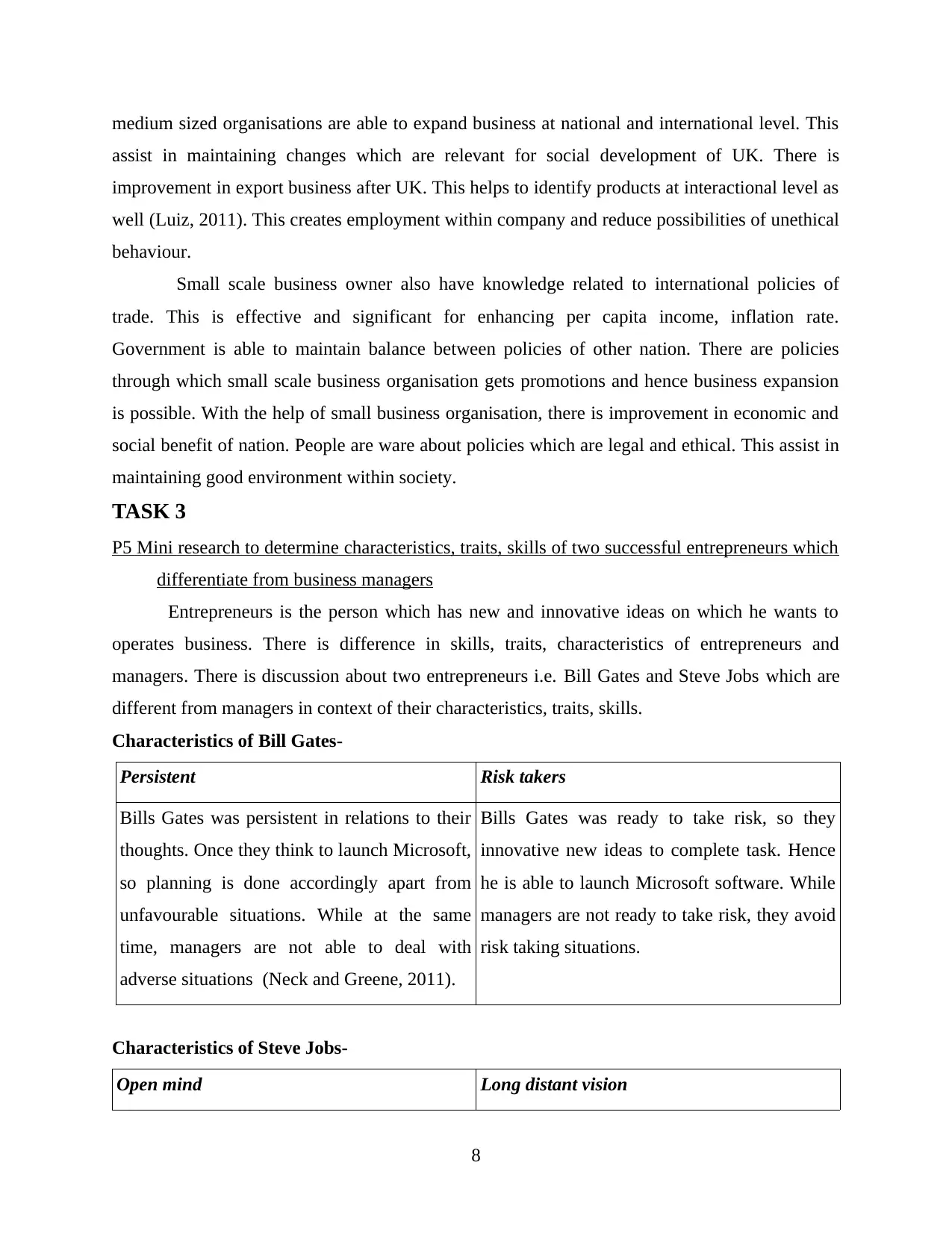
medium sized organisations are able to expand business at national and international level. This
assist in maintaining changes which are relevant for social development of UK. There is
improvement in export business after UK. This helps to identify products at interactional level as
well (Luiz, 2011). This creates employment within company and reduce possibilities of unethical
behaviour.
Small scale business owner also have knowledge related to international policies of
trade. This is effective and significant for enhancing per capita income, inflation rate.
Government is able to maintain balance between policies of other nation. There are policies
through which small scale business organisation gets promotions and hence business expansion
is possible. With the help of small business organisation, there is improvement in economic and
social benefit of nation. People are ware about policies which are legal and ethical. This assist in
maintaining good environment within society.
TASK 3
P5 Mini research to determine characteristics, traits, skills of two successful entrepreneurs which
differentiate from business managers
Entrepreneurs is the person which has new and innovative ideas on which he wants to
operates business. There is difference in skills, traits, characteristics of entrepreneurs and
managers. There is discussion about two entrepreneurs i.e. Bill Gates and Steve Jobs which are
different from managers in context of their characteristics, traits, skills.
Characteristics of Bill Gates-
Persistent Risk takers
Bills Gates was persistent in relations to their
thoughts. Once they think to launch Microsoft,
so planning is done accordingly apart from
unfavourable situations. While at the same
time, managers are not able to deal with
adverse situations (Neck and Greene, 2011).
Bills Gates was ready to take risk, so they
innovative new ideas to complete task. Hence
he is able to launch Microsoft software. While
managers are not ready to take risk, they avoid
risk taking situations.
Characteristics of Steve Jobs-
Open mind Long distant vision
8
assist in maintaining changes which are relevant for social development of UK. There is
improvement in export business after UK. This helps to identify products at interactional level as
well (Luiz, 2011). This creates employment within company and reduce possibilities of unethical
behaviour.
Small scale business owner also have knowledge related to international policies of
trade. This is effective and significant for enhancing per capita income, inflation rate.
Government is able to maintain balance between policies of other nation. There are policies
through which small scale business organisation gets promotions and hence business expansion
is possible. With the help of small business organisation, there is improvement in economic and
social benefit of nation. People are ware about policies which are legal and ethical. This assist in
maintaining good environment within society.
TASK 3
P5 Mini research to determine characteristics, traits, skills of two successful entrepreneurs which
differentiate from business managers
Entrepreneurs is the person which has new and innovative ideas on which he wants to
operates business. There is difference in skills, traits, characteristics of entrepreneurs and
managers. There is discussion about two entrepreneurs i.e. Bill Gates and Steve Jobs which are
different from managers in context of their characteristics, traits, skills.
Characteristics of Bill Gates-
Persistent Risk takers
Bills Gates was persistent in relations to their
thoughts. Once they think to launch Microsoft,
so planning is done accordingly apart from
unfavourable situations. While at the same
time, managers are not able to deal with
adverse situations (Neck and Greene, 2011).
Bills Gates was ready to take risk, so they
innovative new ideas to complete task. Hence
he is able to launch Microsoft software. While
managers are not ready to take risk, they avoid
risk taking situations.
Characteristics of Steve Jobs-
Open mind Long distant vision
8
Paraphrase This Document
Need a fresh take? Get an instant paraphrase of this document with our AI Paraphraser
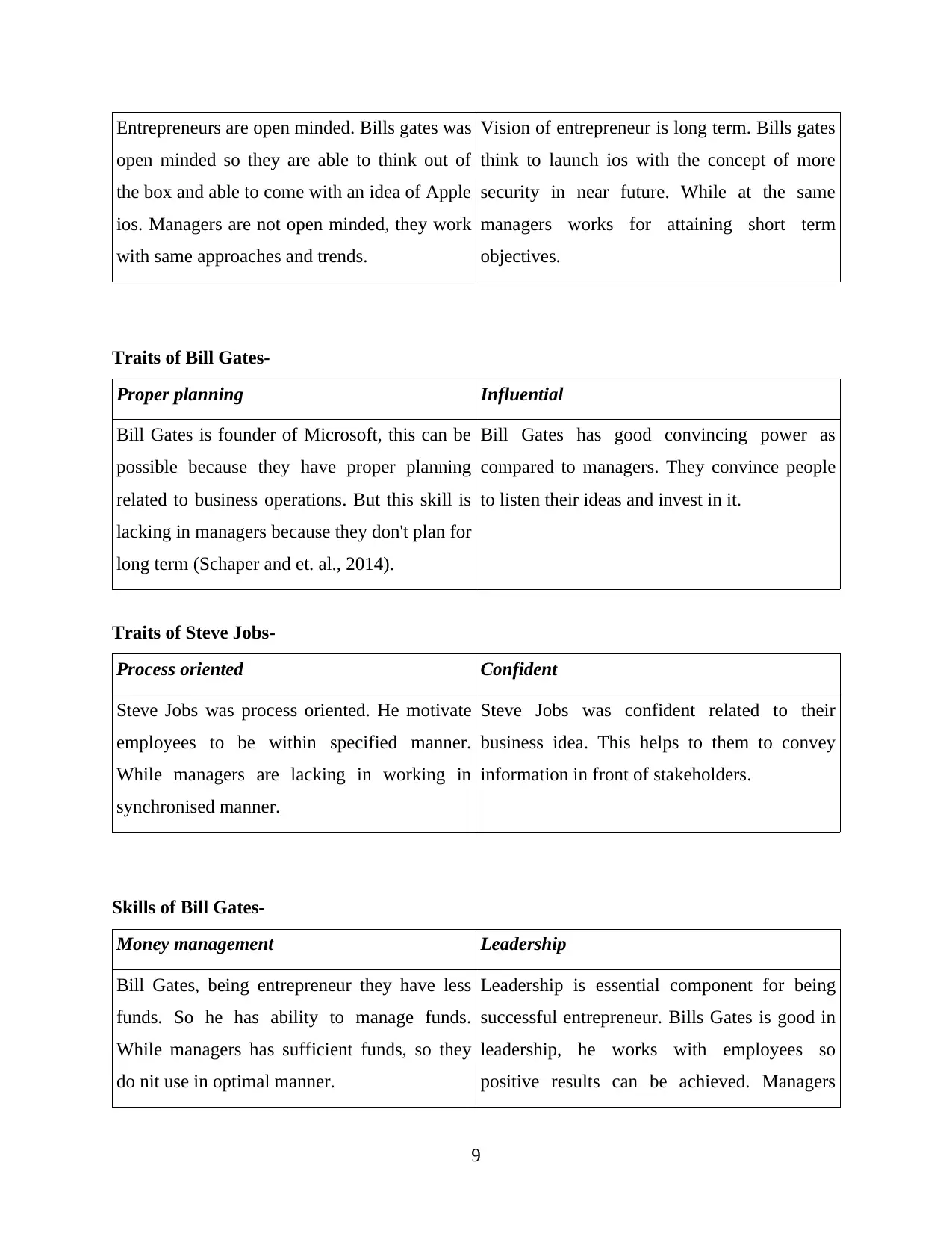
Entrepreneurs are open minded. Bills gates was
open minded so they are able to think out of
the box and able to come with an idea of Apple
ios. Managers are not open minded, they work
with same approaches and trends.
Vision of entrepreneur is long term. Bills gates
think to launch ios with the concept of more
security in near future. While at the same
managers works for attaining short term
objectives.
Traits of Bill Gates-
Proper planning Influential
Bill Gates is founder of Microsoft, this can be
possible because they have proper planning
related to business operations. But this skill is
lacking in managers because they don't plan for
long term (Schaper and et. al., 2014).
Bill Gates has good convincing power as
compared to managers. They convince people
to listen their ideas and invest in it.
Traits of Steve Jobs-
Process oriented Confident
Steve Jobs was process oriented. He motivate
employees to be within specified manner.
While managers are lacking in working in
synchronised manner.
Steve Jobs was confident related to their
business idea. This helps to them to convey
information in front of stakeholders.
Skills of Bill Gates-
Money management Leadership
Bill Gates, being entrepreneur they have less
funds. So he has ability to manage funds.
While managers has sufficient funds, so they
do nit use in optimal manner.
Leadership is essential component for being
successful entrepreneur. Bills Gates is good in
leadership, he works with employees so
positive results can be achieved. Managers
9
open minded so they are able to think out of
the box and able to come with an idea of Apple
ios. Managers are not open minded, they work
with same approaches and trends.
Vision of entrepreneur is long term. Bills gates
think to launch ios with the concept of more
security in near future. While at the same
managers works for attaining short term
objectives.
Traits of Bill Gates-
Proper planning Influential
Bill Gates is founder of Microsoft, this can be
possible because they have proper planning
related to business operations. But this skill is
lacking in managers because they don't plan for
long term (Schaper and et. al., 2014).
Bill Gates has good convincing power as
compared to managers. They convince people
to listen their ideas and invest in it.
Traits of Steve Jobs-
Process oriented Confident
Steve Jobs was process oriented. He motivate
employees to be within specified manner.
While managers are lacking in working in
synchronised manner.
Steve Jobs was confident related to their
business idea. This helps to them to convey
information in front of stakeholders.
Skills of Bill Gates-
Money management Leadership
Bill Gates, being entrepreneur they have less
funds. So he has ability to manage funds.
While managers has sufficient funds, so they
do nit use in optimal manner.
Leadership is essential component for being
successful entrepreneur. Bills Gates is good in
leadership, he works with employees so
positive results can be achieved. Managers
9
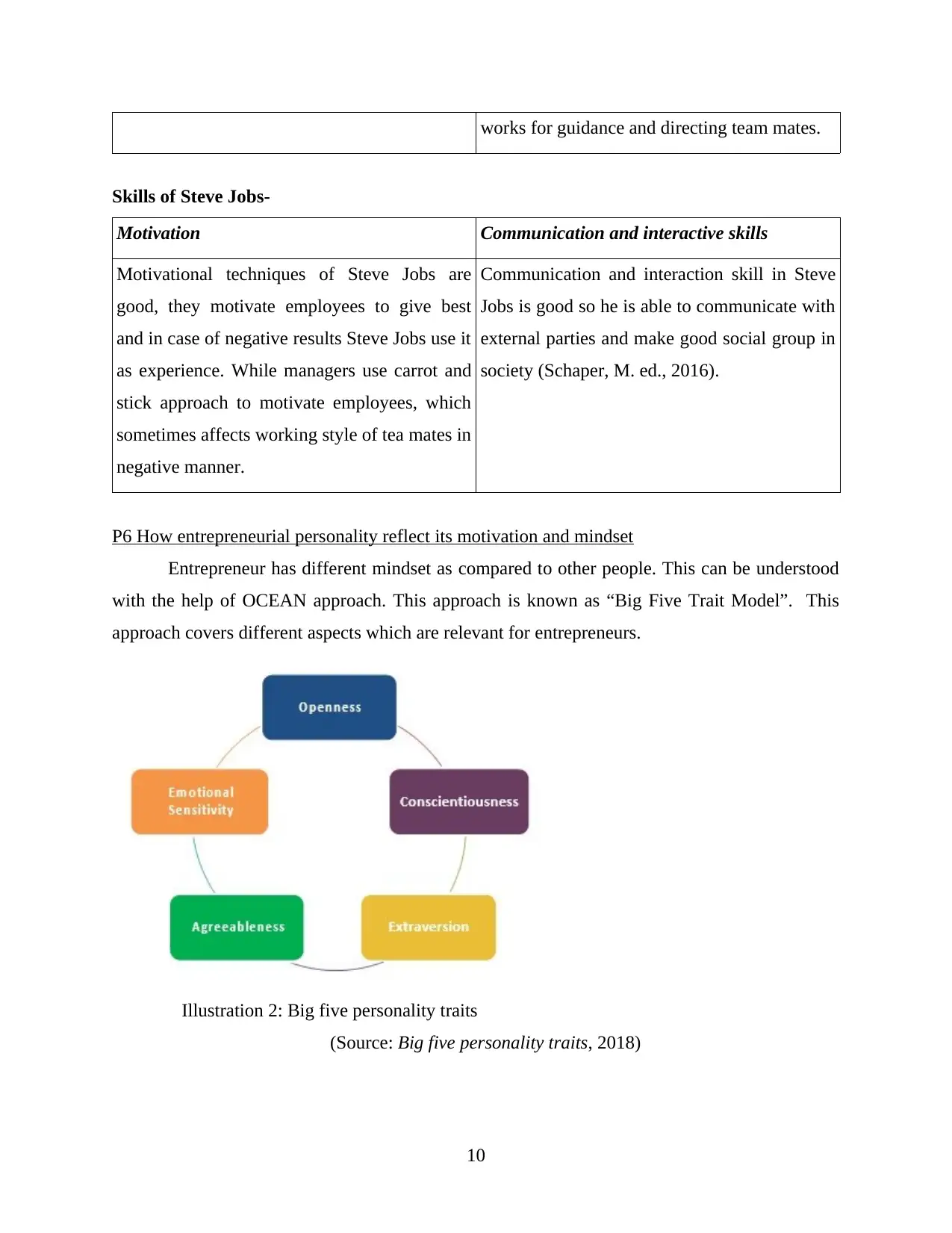
works for guidance and directing team mates.
Skills of Steve Jobs-
Motivation Communication and interactive skills
Motivational techniques of Steve Jobs are
good, they motivate employees to give best
and in case of negative results Steve Jobs use it
as experience. While managers use carrot and
stick approach to motivate employees, which
sometimes affects working style of tea mates in
negative manner.
Communication and interaction skill in Steve
Jobs is good so he is able to communicate with
external parties and make good social group in
society (Schaper, M. ed., 2016).
P6 How entrepreneurial personality reflect its motivation and mindset
Entrepreneur has different mindset as compared to other people. This can be understood
with the help of OCEAN approach. This approach is known as “Big Five Trait Model”. This
approach covers different aspects which are relevant for entrepreneurs.
Illustration 2: Big five personality traits
(Source: Big five personality traits, 2018)
10
Skills of Steve Jobs-
Motivation Communication and interactive skills
Motivational techniques of Steve Jobs are
good, they motivate employees to give best
and in case of negative results Steve Jobs use it
as experience. While managers use carrot and
stick approach to motivate employees, which
sometimes affects working style of tea mates in
negative manner.
Communication and interaction skill in Steve
Jobs is good so he is able to communicate with
external parties and make good social group in
society (Schaper, M. ed., 2016).
P6 How entrepreneurial personality reflect its motivation and mindset
Entrepreneur has different mindset as compared to other people. This can be understood
with the help of OCEAN approach. This approach is known as “Big Five Trait Model”. This
approach covers different aspects which are relevant for entrepreneurs.
Illustration 2: Big five personality traits
(Source: Big five personality traits, 2018)
10
⊘ This is a preview!⊘
Do you want full access?
Subscribe today to unlock all pages.

Trusted by 1+ million students worldwide
1 out of 15
Related Documents
Your All-in-One AI-Powered Toolkit for Academic Success.
+13062052269
info@desklib.com
Available 24*7 on WhatsApp / Email
![[object Object]](/_next/static/media/star-bottom.7253800d.svg)
Unlock your academic potential
Copyright © 2020–2026 A2Z Services. All Rights Reserved. Developed and managed by ZUCOL.





